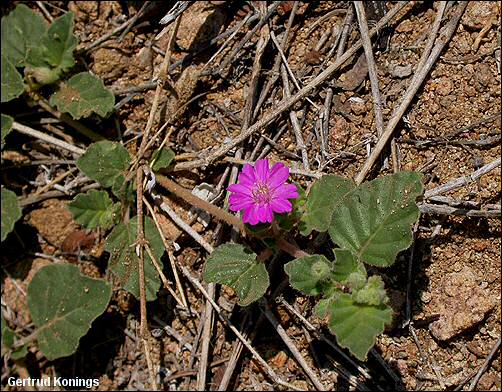

Time after time, when you take a really close look at one of our desert plants or animals, you find that something's not what it seems. Some of these illusions, of course, are commonly known, such as walking-stick insects mimicking twigs or a seemingly dead plant bursting into leaves after the first good rain. Some other things, though, kind of sneak up on you.
Those of you addicted to walking in our desert undoubtedly have seen a
member of the Four O'clock family that's often called Umbrella-wort or Trailing
Allionia. This sprawling herb isn't much to look at except for its pretty
purplish-red to rose-magenta flowers, half an inch or so across. Although an attractive
little spot of color, the flower really doesn't seem at all unusual. But, as you
undoubtedly suspect by now, all is not what it seems--for what looks to the average
person's eyes to be a perfectly normal flower actually is three asymmetrical
flowers hugging each other to foster the illusion of a single bloom. Why? Beats me, but
it sure is pretty!

Contributor: Arthur H. Harris, Laboratory for Environmental Biology, Centennial Museum, University of Texas at El Paso.
Desert Diary is a joint production of the Centennial Museum and KTEP National Public Radio at the University of Texas at El Paso.

Flowers and leaves of Allionia incarnata. The "flower" actually consists of three flowers masquerading as one. Photograph from the Big Bend by Gertrud Konings.